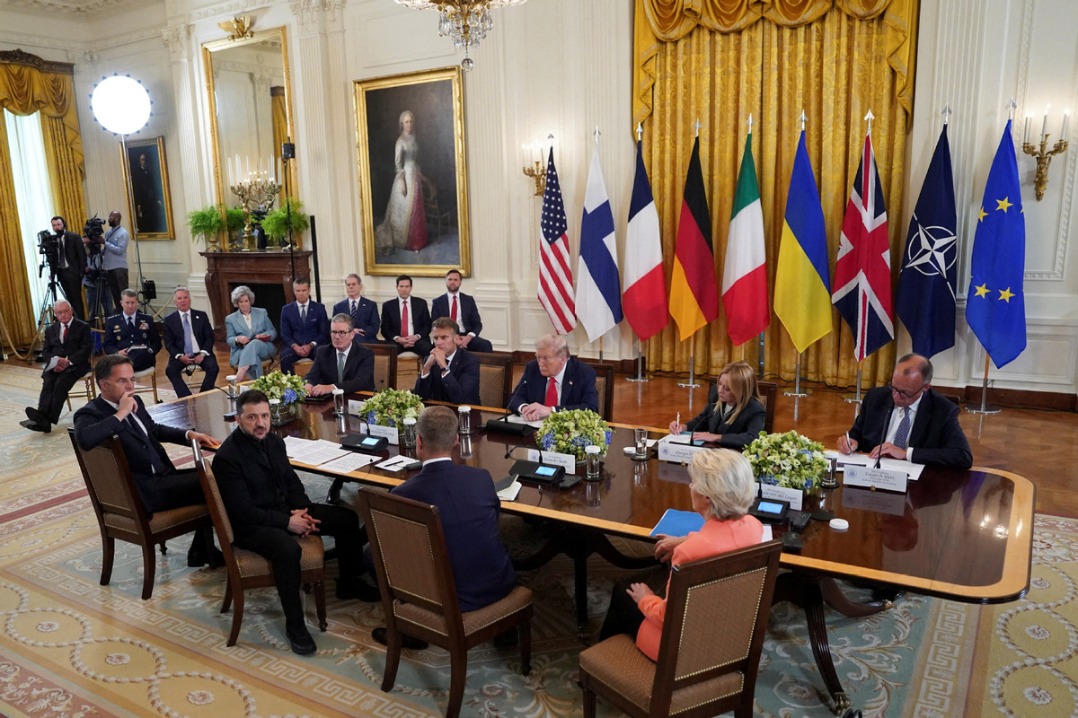Regulations for big tech firms a global trend


In the United States, the executive branch, courts and the Congress are moving to restrict the dominance of the US tech giants.
In the 1960s, the US economy was driven by the automobile sector's "Big Three"-General Motors, Chrysler and Ford. Today, it is fueled by Big Tech. In the past decade, Big Tech has revolutionized the internet economy, but allegedly also abused its dominance.
In June 2019, the antitrust enforcers agreed to focus on Google, Apple, Facebook and Amazon, while dividing responsibility over investigations. In October 2020, the House Judiciary Committee issued a report recommending a range of measures to address the tech giants' allegedly anticompetitive conduct. And in June 2021, the committee issued a series of antitrust bills directed at Big Tech.
Last December, the US Federal Trade Commission, in cooperation with 46 US states, launched an antitrust lawsuit against Facebook regarding its acquisition of two rivals, Instagram and WhatsApp, and the consequent monopoly power. And the antitrust division of the US Department of Justice is preparing a second monopoly lawsuit against Alphabet's Google over its digital advertising business.
The Congress, too, may pursue legislation to address Big Tech's anticompetitive conduct.
These are just some of the recent signals that US antitrust laws and regulations may be about to toughen.
Big Tech's market cap over $9 trillion
The combined market capitalization of the largest five high-tech giants reflects their dominance. It exceeds $9 trillion: Apple, ($2.4 trillion), Microsoft ($2.2 trillion), Google ($1.8 trillion), Amazon ($1.7 trillion) and Facebook ($1.0 trillion). It is their controversial conduct that has made them the targets of the antitrust law and law enforcers.
In the United States, antitrust laws emerged with industrialization, income polarization, and the Big Business in the late 19th century. That's when the Sherman Antitrust Act (1890), Clayton Act (1914) and the Federal Trade Commission Act (1914) were enacted to promote competition and check monopolies. These laws have been interpreted and enforced differently in different times.
If the more permissive "rule of reason" reflected the early antitrust policies, the post-Depression trust-busting lawyers relied on "structuralist" rules targeted against excessive market concentration. As neoliberal economic policies triumphed in the 1970s, they were paralleled by the rise of the "Chicago School" and its more permissive antitrust views, presumably resting on law and economics.
Leverages of Big Business
Since then, these interpretations have reflected the leverage of Big Business, but also concerns about global competitiveness. Over the past decade, criticism against Big Tech has intensified, as evidenced by expanded antitrust investigations in the US and the European Union.
The first Big Tech case occurred when 19 states and the US Department of Justice sued Microsoft in 1999. Despite the ruling to split the software giant, subsequent years of wheeling and dealing resulted in a settlement without a breakup.
Recently, the Federal Trade Commission found that the Big Five had engaged in 616 acquisitions between 2010 and 2019-each of them above $1 million and yet too small to be reported to antitrust agencies.
When US President Joe Biden appointed Lina Khan to chair the FTC early this year and Jonathan Kanter to head the Justice Department's trust-busting unit, the moves were cheered by antitrust reformers. But soon Big Tech counterattacks followed, as they began blaming Khan and Kanter for "unfair bias" and "conflict of interest"-but without legal merits.
The real challenge to US trust-busting efforts is the "revolving door" politics. For years, Big Tech has been recruiting antitrust regulators from the FTC and the Justice Department. Coming from the executive suites of the companies they should oversee, the antitrust law enforcers are disinclined to turn against their former or potential future employers.
The problem is systemic and translates into conflicts of interest and moral hazards-at the expense of competition and consumers' rights and interests.
To a degree, US antitrust practices are paralleled by similar trends in other high-income Western economies. But since US tech giants reign over the global technology sector, their dominance does warrant greater scrutiny.
In the past decade, quite a few multinational companies have emerged from developing economies, too, including Chinese internet giants Tencent, Alibaba, JD and Baidu, and hence the emergence of China's anti-monopoly law since 2008.
Yet antitrust laws in emerging economies are complicated due to some additional considerations. Per capita income in some companies' home markets is significantly lower than in the West. So, big companies must rely on cost-efficient operations, which are hard to replicate by multinationals based in rich countries. That's why US car-makers, GM and Ford, have recently exited India.
Second, domestic markets nurtured the domestic monopoly conduct of US tech giants until the rise of European and Japanese challengers in the 1960s and 1970s. By contrast, challengers in emerging economies have had to struggle with richer and globalized tech giants from the start.
Third, the Donald Trump and Joe Biden administrations have especially used controversial instruments against Chinese tech challengers, including tariff wars and protectionism, unilateral sanctions not supported by international law. Such conducts do not appear to be motivated by competitive concerns, but by geopolitics to capture 5G leadership for military purposes.
Distinctive challenges, distinctive policies
Competitive considerations and the distinctive challenges-lower purchasing power, global competition and controversial protectionist attacks-highlight the importance of equally distinctive antitrust policies in China and other emerging economies.
Antitrust authorities must seek to ensure fair and competitive markets at home. Yet they cannot ignore the impacts of global competition, including adverse trends and controversial practices against challengers from developing economies.
It's a difficult balancing act.
The views don't necessarily reflect those of China Daily.
The author is the founder of Difference Group and has served at the India, China and America Institute (USA), Shanghai Institutes for International Studies (China), and the EU Centre (Singapore).


































